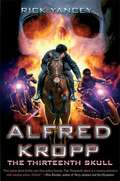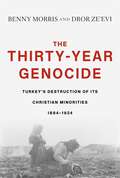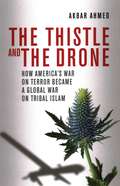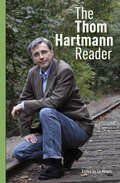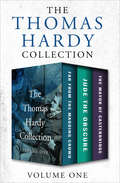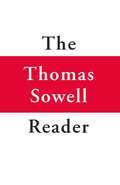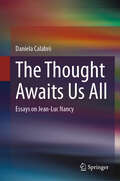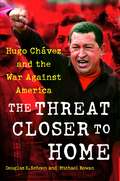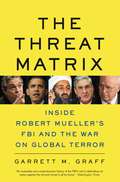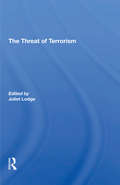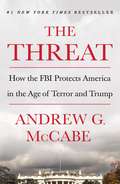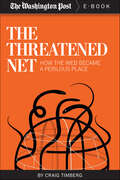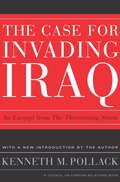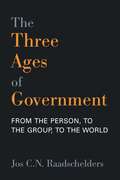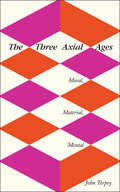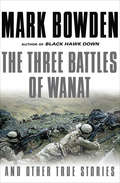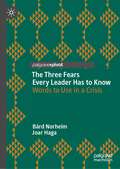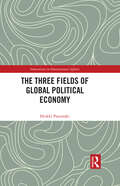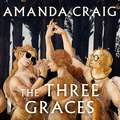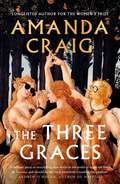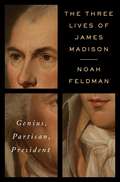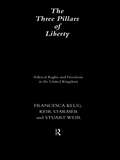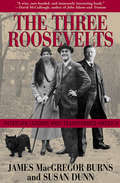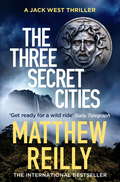- Table View
- List View
The Thirteenth Skull (Alfred Kropp #3)
by Rick YanceyFirst Alfred Kropp lost--and found--the legendary sword Excalibur. Then he defeated King Paimon, arguably the nastiest of the demons to escape when the Seals of Solomon were stolen. What could be left? Plenty, it turns out. Not only is someone out to kill Alfred, but the very people who have sworn to protect him are now trying to use him for deadly means: creating a superhuman army. Trust and betrayal will clash in terrifying ways as Alfred struggles to hold his enemies at bay, even as he learns the full scope of OIPEPs plans for him.
The Thirty-Year Genocide: Turkey’s Destruction of Its Christian Minorities, 1894–1924
by Benny Morris Dror Ze’eviFrom 1894 to 1924 three waves of violence swept across Anatolia, targeting the region’s Christian minorities. Benny Morris and Dror Ze’evi’s impeccably researched account is the first to show that the three were actually part of a single, continuing, and intentional effort to wipe out Anatolia’s Christian population and create a pure Muslim nation.
The Thistle and the Drone
by Akbar AhmedIn the wake of the 9/11 attacks, the United States declared war on terrorism. More than ten years later, the results are decidedly mixed. Here world-renowned author, diplomat, and scholar Akbar Ahmed reveals an important yet largely ignored result of this war: in many nations it has exacerbated the already broken relationship between central governments and the largely rural Muslim tribal societies on the peripheries of both Muslim and non-Muslim nations. The center and the periphery are engaged in a mutually destructive civil war across the globe, a conflict that has been intensified by the war on terror.Conflicts between governments and tribal societies predate the war on terror in many regions, from South Asia to the Middle East to North Africa, pitting those in the centers of power against those who live in the outlying provinces. Akbar Ahmed's unique study demonstrates that this conflict between the center and the periphery has entered a new and dangerous stage with U.S. involvement after 9/11 and the deployment of drones, in the hunt for al Qaeda, threatening the very existence of many tribal societies.American firepower and its vast anti-terror network have turned the war on terror into a global war on tribal Islam. And too often the victims are innocent children at school, women in their homes, workers simply trying to earn a living, and worshipers in their mosques. Battered by military attacks or drone strikes one day and suicide bombers the next, the tribes bemoan, "Every day is like 9/11 for us."In The Thistle and the Drone, the third volume in Ahmed's groundbreaking trilogy examining relations between America and the Muslim world, the author draws on forty case studies representing the global span of Islam to demonstrate how the U.S. has become involved directly or indirectly in each of these societies. The study provides the social and historical context necessary to understand how both central governments and tribal societies have become embroiled in America's war. Beginning with Waziristan and expanding to societies in Central Asia, the Middle East, North Africa, and elsewhere, Ahmed offers a fresh approach to the conflicts studied and presents an unprecedented paradigm for understanding and winning the war on terror. The Thistle and the Drone was the 2013 Foreword Reviews Gold winner for Political Science.
The Thom Hartmann Reader
by Thom HartmannHartmann is perhaps best known for his fierce commitment to Jeffersonian democracy and his steadfast opposition to the corporatization of America. But in these pages you’ll also discover his Older and Younger Cultures hypothesis, which identifies the root cause of so many of our social and environmental ills. You’ll hear from Hartmann on how to keep our schools from treating children like assembly line products, why attention deficit disorder is not an affliction, what cloudy Germany can teach us about solar energy, and much more. Fascinating as these essays are, they’re ultimately meant to inspire you to action. As Hartmann says at the end of every radio program, “Get out there, get active! Tag, you’re it!”
The Thomas Hardy Collection Volume One: Far from the Madding Crowd, Jude the Obscure, and The Mayor of Casterbridge
by Thomas HardyThree classics of the Victorian era from the great novelist. This volume includes three iconic novels by the author known for chronicling nineteenth-century English society. Far from the Madding Crowd: A tale of love, tragedy, and a woman brave enough to defy convention. Jude the Obscure: A young stonemason who had aspired to a career in academia finds himself trapped in an unhappy marriage in this novel of passion and heartbreak. The Mayor of Casterbridge: A wealthy mayor harbors a terrible secret in this story of addiction, love, and regret.
The Thomas Paine Reader
by Thomas PaineEdited by Isaac Kramnick and Michael Foot This major collection demonstrates the extent to which Thomas Paine was an inspiration to the Americans in their struggle for independence, a passionate supporter of the French Revolution and perhaps the outstanding English radical writer of his age. It contains all of Paine's major works including Rights of Man, his groundbreaking defence of the revolutionary cause in France; Common Sense, which won thousands over to the side of the American rebels; and the first part of The Age of Reason, a ferocious attack on Christianity. The shorter pieces--on capital punishment, social reform and the abolition of slavery--also confirm the great versatility and power of this master of democratic prose.
The Thomas Sowell Reader
by Thomas SowellThese selections from the many writings of Thomas Sowell over a period of a half century cover social, economic, cultural, legal, educational, and political issues. The sources range from Dr. Sowell's letters, books, newspaper columns, and articles in both scholarly journals and popular magazines. The topics range from late-talking children to "tax cuts for the rich," baseball, race, war, the role of judges, medical care, and the rhetoric of politicians. These topics are dealt with by sometimes drawing on history, sometimes drawing on economics, and sometimes drawing on a sense of humor.
The Thought Awaits Us All: Essays on Jean-Luc Nancy
by Daniela CalabròThis volume shows how Nancy was able ‘to deconstruct’ the founding sign of all metaphysics and all transcendence by redefining the concepts of existence, corporeality, and community, opening them up to the ‘disclosure’ of the outside, to the ‘exception’ of the world. It draws on the work of the Italian philosopher, Roberto Esposito and includes a dialogue between Nancy and Esposito. The overcoming of the modern perspective is covered by Descartes and Hegel, who are analyzed in light of Nancy. This text proposes a deconstruction of the Western tradition in its philosophical, aesthetic, and political registers and conveys a new ontology that breaks with the categories of the One and the Multiple, the Universal and the Particular, in order to identify the relationship between the plural and the singular and understand what it means to be together, to be in common, to be in the world. It is suitable for scholars, researchers, and students of philosophy and comparative literature.
The Threat Closer to Home: Hugo Chavez and the War Against America
by Douglas Schoen Michael RowanA chilling account of Hugo Chávez's shadow war on the United States The American government has shrugged off South American politics for nearly forty years. In the meantime, our neighbor to the south has grown into an unprecedented threat. Hugo Chávez, the current president of Venezuela and a self-proclaimed enemy of the United States, commands what even Osama bin Laden only dreams of -- but few Americans see him as a true danger to this country. This book argues that we should. Chávez has the means and the motivation to harm the United States in a way that few other countries can, and he has declared an "asymmetric war" against America. He runs a sovereign nation that is the fourth largest supplier of oil to the United States. He enjoys annual windfall oil profits that equal the net worth of Bill Gates. He has more modern weapons than anyone in Latin America. He has strategic alliances with Iran, North Korea, and other enemies of America, yet he has duped many Americans -- from influential political and cultural leaders to ordinary citizens who benefit from his oil largess through his state-owned oil company -- into believing that he is a friend. Drawing on two decades of experience working at the highest level of Venezuelan and American politics, Schoen and Rowan go behind the scenes to examine Chávez's efforts to subvert both the American economy and his own country's stability. Not only did he help drive the price of oil from ten dollars a barrel to more than a hundred dollars a barrel, he's sponsored and become increasingly involved in civilian massacres, drug running, money laundering, nuclear weapons proliferation, and terrorist training. Schoen and Rowan have both the insight and the access to make a case not yet made in the American media. Over the course of the past decade while living and working in Venezuela as writers and political consultants, they've investigated Ch vez's past, explored his family connections, and gone up against him in a series of elections. Their startling revelations about Ch vez's rise to power and his reach into American politics make this the kind of urgent, newsbreaking narrative that will spark vital debate in the corridors of power.
The Threat Matrix: The FBI at War in the Age of Global Terror
by Garrett M. GraffThe Threat Matrix is the story of a small group of FBI agents who believed that they could confront a new generation of international terrorists like al Qaeda without sacrificing America's moral high ground. At the heart of this classic good versus evil battle are decades of tensions between the FBI and the CIA, which repeatedly fell short as America's eyes overseas. Given unprecedented access, thousands of pages of once secret documents, and hundreds of interviews, Garrett M. Graff takes us inside the FBI and its attempt to protect America. From the corridors of the Hoover Building to the cells of Gitmo and the mountains of Afghanistan and Pakistan, Graff tells the true story of how a generation of FBI agents taught themselves to confront threats no one had ever seen before. Brilliantly reported and suspensefully told, The Threat Matrix peers into the darkest corners of this secret war and will change your view of the FBI forever.
The Threat Of Terrorism: Combating Political Violence In Europe
by Juliet LodgeThis book is concerned with terrorism in West European liberal democratic states and with the way in which they react, as a group in the European Community, to international terrorism. It interprets terrorism as a means of attempting to effect political change by the indiscriminate use of violence.
The Threat: How the FBI Protects America in the Age of Terror and Trump
by Andrew G. McCabeThe Instant #1 New York Times Bestseller!On March 16, 2018, just twenty-six hours before his scheduled retirement from the organization he had served with distinction for more than two decades, Andrew G. McCabe was fired from his position as deputy director of the FBI. President Donald Trump celebrated on Twitter: "Andrew McCabe FIRED, a great day for the hard working men and women of the FBI - A great day for Democracy."In The Threat: How the FBI Protects America in the Age of Terror and Trump, Andrew G. McCabe offers a dramatic and candid account of his career, and an impassioned defense of the FBI's agents, and of the institution's integrity and independence in protecting America and upholding our Constitution.McCabe started as a street agent in the FBI's New York field office, serving under director Louis Freeh. He became an expert in two kinds of investigations that are critical to American national security: Russian organized crime—which is inextricably linked to the Russian state—and terrorism. Under Director Robert Mueller, McCabe led the investigations of major attacks on American soil, including the Boston Marathon bombing, a plot to bomb the New York subways, and several narrowly averted bombings of aircraft. And under James Comey, McCabe was deeply involved in the controversial investigations of the Benghazi attack, the Clinton Foundation's activities, and Hillary Clinton's use of a private email server when she was secretary of state.The Threat recounts in compelling detail the time between Donald Trump's November 2016 election and McCabe's firing, set against a page-turning narrative spanning two decades when the FBI's mission shifted to a new goal: preventing terrorist attacks on Americans. But as McCabe shows, right now the greatest threat to the United States comes from within, as President Trump and his administration ignore the law, attack democratic institutions, degrade human rights, and undermine the U.S. Constitution that protects every citizen. Important, revealing, and powerfully argued, The Threat tells the true story of what the FBI is, how it works, and why it will endure as an institution of integrity that protects America.
The Threatened Net: How the Web Became a Perilous Place
by Craig Timberg The Washington PostThe Internet can appear to be elegantly designed, but as The Washington Post’s Craig Timberg demonstrated in his illuminating series “Net of Insecurity,” the network is much more an assemblage of kludges—more Frankenstein than Ferrari—that endure because they work, or at least work well enough. The defects hackers use often are well-known and ancient in technological terms, surviving only because of an industry-wide penchant for patching over problems rather than replacing the rot – and because Washington largely shrugged. At critical moments in the development of the Internet, some of the country’s smartest minds warned leaders at the Pentagon and in Congress, but were largely ignored. The consequences now play out across cyberspace every second of every day, as hackers exploit old, poorly protected systems to scam, steal, and spy on a scale never before possible. Today, hundreds of billions of dollars are spent on computer security and the danger posed by hackers seems to grow worse each year, threatening banks, retailers, government agencies, a Hollywood studio and, experts worry, critical mechanical systems in dams, power plants, and aircraft. Many have tried to write about the origins of the Internet. But never before has a writer so thoroughly elucidated the history of the security of the Internet—and why basic flaws in its design continue to leave this country wide open to digital threats.
The Threatening Storm
by Kenneth M. PollackIn The Threatening Storm, Kenneth M. Pollack, one of the world’s leading experts on Iraq, provides a masterly insider’s perspective on the crucial issues facing the United States as it moves toward a new confrontation with Saddam Hussein.<P> For the past fifteen years, as an analyst on Iraq for the Central Intelligence Agency and the National Security Council, Kenneth Pollack has studied Saddam as closely as anyone else in the United States. In 1990, he was one of only three CIA analysts to predict the Iraqi invasion of Kuwait. As the principal author of the CIA’s history of Iraqi military strategy and operations during the Gulf War, Pollack gained rare insight into the methods and workings of what he believes to be the most brutal regime since Stalinist Russia.<P> Examining all sides of the debate and bringing a keen eye to the military and geopolitical forces at work, Pollack ultimately comes to this controversial conclusion: through our own mistakes, the perfidy of others, and Saddam’s cunning, the United States is left with few good policy options regarding Iraq. Increasingly, the option that makes the most sense is for the United States to launch a full-scale invasion, eradicate Saddam’s weapons of mass destruction, and rebuild Iraq as a prosperous and stable society—for the good of the United States, the Iraqi people, and the entire region.<P> Pollack believed for many years that the United States could prevent Saddam from threatening the stability of the Persian Gulf and the world through containment—a combination of sanctions and limited military operations. Here, Pollack explains why containment is no longer effective, and why other policies intended to deter Saddam ultimately pose a greater risk than confronting him now, before he gains possession of nuclear weapons and returns to his stated goal of dominating the Gulf region. “It is often said that war should be employed only in the last resort,” Pollack writes. “I reluctantly believe that in the case of the threat from Iraq, we have come to the last resort.”<P> Offering a view of the region that has the authority and force of an intelligence report, Pollack outlines what the leaders of neighboring Arab countries are thinking, what is necessary to gain their support for an invasion, how a successful U.S. operation would be mounted, what the likely costs would be, and how Saddam might react. He examines the state of Iraq today—its economy, its armed forces, its political system, the status of its weapons of mass destruction as best we understand them, and the terrifying security apparatus that keeps Saddam in power. Pollack also analyzes the last twenty years of relations between the United States and Iraq to explain how the two countries reached the unhappy standoff that currently prevails.<P> Commanding in its insights and full of detailed information about how leaders on both sides will make their decisions, The Threatening Storm is an essential guide to understanding what may be the crucial foreign policy challenge of our time.
The Three Ages of Government: From the Person, to the Group, to the World
by Jos C.N. RaadscheldersIt is only in the last 250 years that ordinary people (in some parts of the world) have become citizens rather than subjects. This change happened in a very short period, between 1780 and 1820, a result of the foundations of democracy laid in the age of revolutions. A century later local governments embraced this shift due to rapid industrialization, urbanization, and population growth. During the twentieth century, all democratic governments began to perform a range of tasks, functions, and services that had no historical precedent. In the thirty years following the Second World War, Western democracies created welfare states that, for the first time in history, significantly reduced the gap between the wealthy and everyone else. Many of the reforms of that postwar period have been since rolled back because of the belief that government should be more like a business. Jos C.N. Raadschelders provides the information that all citizens should have about their connections to government, why there is a government, what it does, how it does it, and why we can no longer do without it. The Three Ages of Government rises above stereotypical thinking to show the centrality of government in human life.
The Three Axial Ages: Moral, Material, Mental
by John TorpeyHow should we think about the “shape” of human history since the birth of cities, and where are we headed? Sociologist and historian John Torpey proposes that the “Axial Age” of the first millennium BCE, when some of the world’s major religious and intellectual developments first emerged, was only one of three such decisive periods that can be used to directly affect present social problems, from economic inequality to ecological destruction. Torpey’s argument advances the idea that there are in fact three “Axial Ages,” instead of one original Axial Age and several subsequent, smaller developments. Each of the three ages contributed decisively to how humanity lives, and the difficulties it faces. The earliest, or original, Axial Age was a moral one; the second was material, and revolved around the creation and use of physical objects; and the third is chiefly mental, and focused on the technological. While there are profound risks and challenges, Torpey shows how a worldview that combines the strengths of all three ages has the potential to usher in a period of exceptional human freedom and possibility.
The Three Battles of Wanat: And Other True Stories
by Mark BowdenFrom the #1 New York Times–bestselling author of Black Hawk Down: “a first-rate collection” of long-form journalism on war, sports, politics, and more (Booklist). Mark Bowden has established himself as one of America’s leading journalists and nonfiction writers. The Three Battles of Wanat collects the best of his long-form articles, including pieces from the Atlantic, Vanity Fair, the New Yorker, and the Philadelphia Inquirer. The titular article delves into one of the bloodiest days of the War in Afghanistan and the years-long fallout it generated within the United States military. In “The Killing Machines,” Bowden examines the strategic, legal, and moral issues surrounding armed drones. And in a brilliant piece on Kim Jong-un called “The Bright Sun of Juche,” he recalibrates our understanding of the world’s youngest and most baffling dictator. Also included are profiles of newspaper scion Arthur Sulzberger; renowned defense attorney and anti-death-penalty activist Judy Clarke; professional gambler Don Johnson, who won six million dollars in a single night playing blackjack; and David Simon, the creator of the legendary HBO series The Wire. “Mark Bowden marshals his finest for The Three Battles of Wanat.” —Vanity Fair
The Three Fears Every Leader Has to Know: Words to Use in a Crisis
by Bård Norheim Joar HagaFear is an inescapable part of how human beings experience reality. The impact of fear becomes particularly evident in a crisis. When a crisis strikes, be it a war, a pandemic, global warming or a financial crisis, leaders are challenged to exercise sound judgement by speaking and acting. This book argues that there are three fears every leader has to know – apocalyptic fear, political fear, and private fear. By appealing to these three fears in an adequate manner, a leader’s appeal to fear may serve a constructive purpose in a crisis.
The Three Fields of Global Political Economy (Innovations in International Affairs)
by Heikki PatomäkiThe Three Fields of Global Political Economy provides a systematic and future-oriented account of global political economy dynamics since the Industrial Revolution and argues that major changes and conflicting processes can be understood through the concept of these three fields. The first field is constituted by the circuit of capital and is characterised by a tendency towards economic liberalism. The second field is brought about by reactions to, and learning from, cycles and crises and various negative experiences. The third field is the field of reason of state. It is evoked by struggles within and among states and has its own inner generative structures. This book analyses the generic dynamics of these three fields of global political economy and explores their most significant causal effects, such as growth, employment, distribution of income and wealth, wars, and ecological effects. Together, the prevailing three fields, as well as the ideas and causal forces which generate them, constitute the "holomovement" of the global political economy. This book will appeal to advanced students and scholars of global studies, international relations, international political economy, economic theory, and governance, as well as those working in social theory and sociology, and to a broader audience interested in socioeconomics.
The Three Graces
by Amanda Craig'Hugely entertaining' Telegraph'She's such a skilful storyteller who vividly dramatises our lives with wit, wisdom and compassion'BERNARDINE EVARISTO'I revelled in The Three Graces - such an intriguing cast, so convincingly presented, and a narrative that continually surprises' PENELOPE LIVELY'A brilliant piece of storytelling... it should be the book everybody's reading this summer'ANDREW O'HAGAN'Gorgeous and generous... rich with characters and suffused with sunlight' LISSA EVANS When Enzo shoots an illegal migrant from his bedroom one night, it triggers a series of events that embroil old and young, rich and poor, native and foreign. His elderly neighbours Ruth, Diana and Marta are three friends who have retired to Tuscany. Ruth's favourite grandson Olly is about to get married from her idyllic hillside farmhouse; however, the bride, Tania, seems curiously unengaged by anything but vlogging as a social media influencer. Marta, preparing to give the annual music recital sponsored by a Russian oligarch in hiding from Putin, is increasingly unwell, and her grandson, Xan, is full of resentment at the inequalities he encounters. Diana is nursing her husband, Lord Evenlode, who is living with dementia, and looking back over a long and troubled marriage. Over two weeks in May, all these characters will face challenging choices as they grapple with their own past and with present dangers. For although the Tuscan spring looks as ravishing as a Renaissance painting, the realities of modern life make it harder and harder to believe that there is more that unites us than what keeps us apart. Brilliant, enthralling, funny and generous, this is an exploration of the indomitable human heart.
The Three Graces: 'The book everybody should be reading this summer' Andrew O'Hagan
by Amanda Craig'Hugely entertaining' Telegraph'She's such a skilful storyteller who vividly dramatises our lives with wit, wisdom and compassion'BERNARDINE EVARISTO'I revelled in The Three Graces - such an intriguing cast, so convincingly presented, and a narrative that continually surprises' PENELOPE LIVELY'A brilliant piece of storytelling... it should be the book everybody's reading this summer'ANDREW O'HAGAN'Gorgeous and generous... rich with characters and suffused with sunlight' LISSA EVANS When Enzo shoots an illegal migrant from his bedroom one night, it triggers a series of events that embroil old and young, rich and poor, native and foreign. His elderly neighbours Ruth, Diana and Marta are three friends who have retired to Tuscany. Ruth's favourite grandson Olly is about to get married from her idyllic hillside farmhouse; however, the bride, Tania, seems curiously unengaged by anything but vlogging as a social media influencer. Marta, preparing to give the annual music recital sponsored by a Russian oligarch in hiding from Putin, is increasingly unwell, and her grandson, Xan, is full of resentment at the inequalities he encounters. Diana is nursing her husband, Lord Evenlode, who is living with dementia, and looking back over a long and troubled marriage. Over two weeks in May, all these characters will face challenging choices as they grapple with their own past and with present dangers. For although the Tuscan spring looks as ravishing as a Renaissance painting, the realities of modern life make it harder and harder to believe that there is more that unites us than what keeps us apart. Brilliant, enthralling, funny and generous, this is an exploration of the indomitable human heart.
The Three Lives of James Madison: Genius, Partisan, President
by Noah FeldmanA sweeping reexamination of the Founding Father who transformed the United States in each of his political “lives”—as a revolutionary thinker, as a partisan political strategist, and as a president“In order to understand America and its Constitution, it is necessary to understand James Madison.”—Walter Isaacson, #1 New York Times bestselling author of Leonardo da Vinci Over the course of his life, James Madison changed the United States three times: First, he designed the Constitution, led the struggle for its adoption and ratification, then drafted the Bill of Rights. As an older, cannier politician he co-founded the original Republican party, setting the course of American political partisanship. Finally, having pioneered a foreign policy based on economic sanctions, he took the United States into a high-risk conflict, becoming the first wartime president and, despite the odds, winning. In The Three Lives of James Madison, Noah Feldman offers an intriguing portrait of this elusive genius and the constitutional republic he created—and how both evolved to meet unforeseen challenges. Madison hoped to eradicate partisanship yet found himself giving voice to, and institutionalizing, the political divide. Madison’s lifelong loyalty to Thomas Jefferson led to an irrevocable break with George Washington, hero of the American Revolution. Madison closely collaborated with Alexander Hamilton on the Federalist papers—yet their different visions for the United States left them enemies. Alliances defined Madison, too. The vivacious Dolley Madison used her social and political talents to win her husband new supporters in Washington—and define the diplomatic customs of the capital’s society. Madison’s relationship with James Monroe, a mixture of friendship and rivalry, shaped his presidency and the outcome of the War of 1812. We may be more familiar with other Founding Fathers, but the United States today is in many ways Madisonian in nature. Madison predicted that foreign threats would justify the curtailment of civil liberties. He feared economic inequality and the power of financial markets over politics, believing that government by the people demanded resistance to wealth. Madison was the first Founding Father to recognize the importance of public opinion, and the first to understand that the media could function as a safeguard to liberty. The Three Lives of James Madison is an illuminating biography of the man whose creativity and tenacity gave us America’s distinctive form of government. His collaborations, struggles, and contradictions define the United States to this day.
The Three Pillars of Liberty: Political Rights and Freedoms in the United Kingdom (Democratic Audit Of The United Kingdom Ser.)
by Francesca Klug Keir Starmer Stuart WeirFirst published in 2004. Routledge is an imprint of Taylor & Francis, an informa company.
The Three Roosevelts: Patrician Leaders Who Transformed America
by Susan Dunn James MacGregor BurnsAn &“immensely interesting&” account of how Theodore, Franklin, and Eleanor led the United States through some of its most turbulent decades (David McCullough). The Three Roosevelts is the extraordinary political biography of the intertwining lives of Theodore, Franklin, and Eleanor Roosevelt, who emerged from the closed society of New York&’s Knickerbocker elite to become the most prominent American political family of the twentieth century. As Pulitzer Prize– and National Book Award–winning author James MacGregor Burns and acclaimed historian Susan Dunn follow the evolution of the Roosevelt political philosophy, they illuminate how Theodore&’s example of dynamic leadership would later inspire the careers of his distant cousin Franklin and his niece Eleanor, who together forged a progressive political legacy that reverberated throughout the world. Theodore, Franklin, and Eleanor Roosevelt led America through some of the most turbulent times in its history. The Three Roosevelts takes readers on an exhilarating voyage through these tumultuous decades of our nation&’s past, and these momentous events are seen through the Roosevelts&’ eyes, their actions, and their passions. Insightful and authoritative, this is a fascinating portrait of three of America&’s greatest leaders, whose legacy is as controversial today as their vigorous brand of forward-looking politics was in their own lifetimes. &“A remarkable example of narrative and biographical history at its best.&” —Pittsburgh Post-Gazette &“A detailed study . . . Written with impeccable scholarship.&” —Houston Chronicle &“Show[s] how TR set FDR off on reform, and how Eleanor pushed Franklin, and how FDR used Eleanor as his legs . . . and as his conscience.&” —The Boston Globe
The Three Secret Cities (Jack West Series)
by Matthew ReillyJoin one of the world's greatest adventure writers on a non-stop thrill-ride. * * * * *A SHADOW WORLD BEHIND THE REAL WORLDWhen Jack West Jr won the Great Games, he threw the four legendary kingdoms into turmoil.A WORLD WITH ITS OWN HISTORY, RULES AND PRISONSNow these dark forces are coming after Jack... in ruthless fashion.THAT IS REACHING INTO OUR WORLD ... EXPLOSIVELYWith the end of all things rapidly approaching, Jack must find the Three Secret Cities, three incredible lost cities of legend.It's an impossible task by any reckoning, but Jack must do it while he is being hunted... * * * * *JACK'S BACK. Catch up with him in the rest of the international bestselling series.SEVEN ANCIENT WONDERSTHE SIX SACRED STONESTHE FIVE GREATEST WARRIORSTHE FOUR LEGENDARY KINGDOMS
